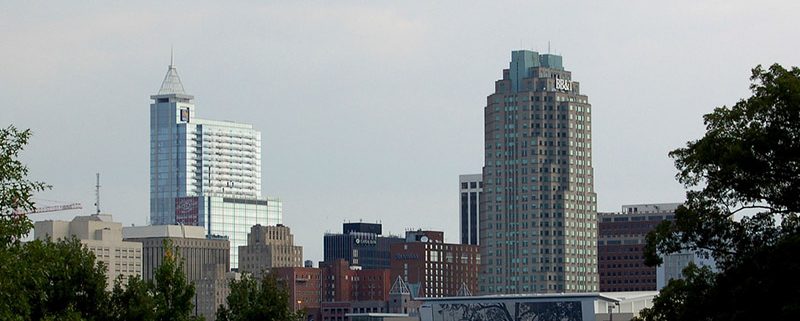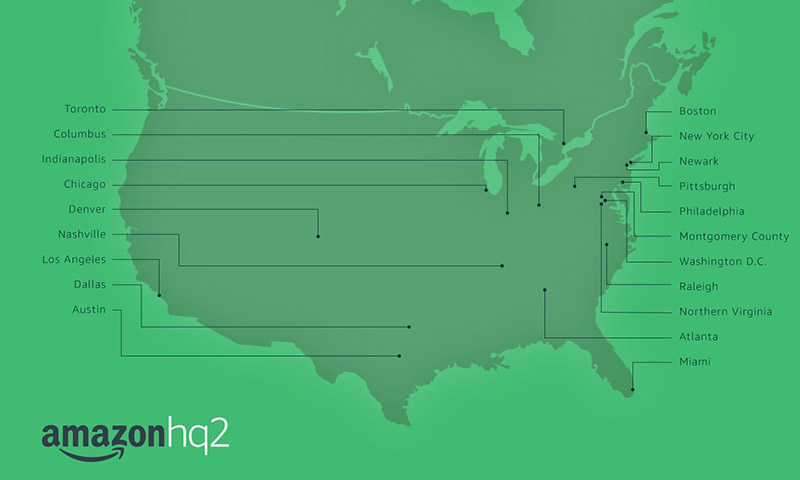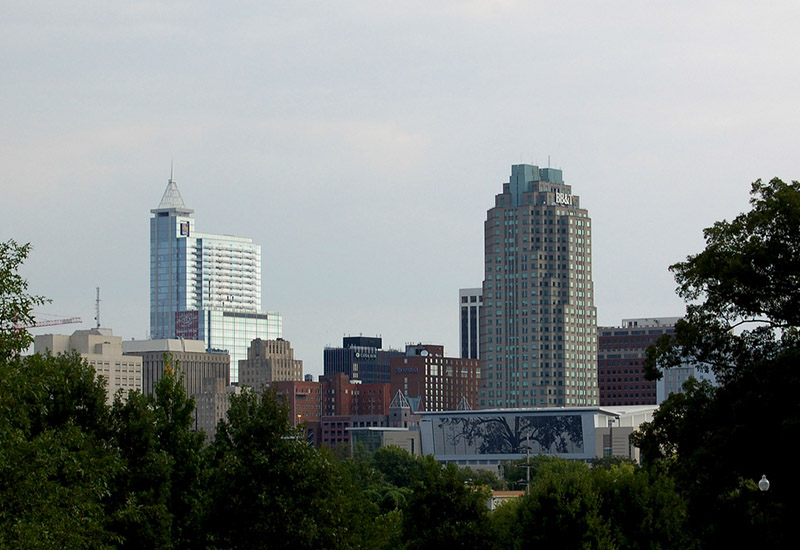As Amazon Narrows HQ2 Picks, Where Does the Triangle Stand?
Cary, NC – Reports show Amazon is planning to narrow its 20-city shortlist for its second headquarters again in the coming weeks, so we look at a new study of the current finalists to help predict if the local area will make the cut.
Where Does the Triangle Rank?
In a recent study by CNBC, the financial news agency looked at Amazon’s own criteria for HQ2, namely:
- A stable and business-friendly environment
- Urban or suburban locations with the potential to attract and retain strong technical talent
- Communities that think big and creatively when considering locations and real estate options
Specifically, the CNBC report says it looks at the states where these finalist cities are located and references data from their own study on best states for businesses.
In the CNBC study, the Triangle, which is listed as just “Raleigh,” scores a B. That puts the local area in the middle of the pack, with only eight other cities scoring lower, including New York City, Pittsburgh, Philadelphia and Chicago.
The Triangle’s biggest strike in the study is Amazon’s requirement for location. This could mean limited real estate options for Amazon to pick an HQ2 location or it could refer to housing options for future employees. Also, public transportation continues to be a sticking point with Amazon and the Triangle and North Carolina
While the study ranks the area’s economy high, it also says political fights between the executive and legislature mean the landscape in North Carolina is not “stable” and therefore it’s harder to for a business to predict what will happen next. The study says these two factors may balance each other out but it is still a listed concern.
In CNBC’s study on best states for businesses, North Carolina came in ninth nationwide, but 21st for infrastructure and 28th for quality of life.
Local Chances
If all the metropolitan areas who rank lower than the Triangle are removed from Amazon’s 20-city list, there are still 12 other cities left. It’s unclear yet how much Amazon will narrow its list in the coming weeks – it could drop it to a final four, it could drop one or two.
Assuming Amazon will trim its shortlist by half, then the Triangle looks like it is just on the bubble. Other cities nearby in CNBC’s ranking are Columbus, Indianapolis and Los Angeles. However, the CNBC study also questions whether Ohio or Indiana have the technology jobs to support the HQ2 campus, where it says the Triangle has done a good job of attracting those sorts of workers.
The top ranking cities are still Atlanta and Boston, with Austin and Dallas both doing the best in this study as well.
Story by staff reports. Photos courtesy of Amazon and Suzie Tremmel.






Search results for “Raleigh” at Google News can be misleading,
compared to:
https://duckduckgo.com/?q=Raleigh&t=hg&iar=news&ia=news
Cary
https://duckduckgo.com/?q=cary+north+carolina&t=hg&iar=news&ia=news
I would not take the CNBC ranking as definitive, simply because of its timing. Back at the turn of May to June, A seemingly more-thorough analysis from Forbes recommended the Triangle area (termed “Raleigh”) as the number one best fit for Amazon. CNBC’s ranking was more heavily loaded with negative assessment of NC’s conservative legislature, ignoring the positive implications of that for stable tax policy
There’s a very strong pattern where the news articles that rank Raleigh as poorly or mediocre in this competition… often have a liberal agenda and they are often extremely vague about their criteria. They also often overlooked quality-of-life issues that truly impact Amazon employees’ way of life.
in contrast, the studies which actually prioritize true quality of life metrics that impact people’s day-to-day lives… Things like crime rates, traffic, cost of living, cost of housing, available housing, weather (this last one sounds silly at first glance, but when many of your days are spent in above 90s heat or below 20s cold… That really is another important quality of life metric)… Those studies that look at these metrics that actually impact the employee’s day-to-day lives put Raleigh at or extremely near the top. Many of these other cities that are highly ranked have horrificly bad violent crime rates and/or much higher costs of living than Raleigh. In many of them you would be terrified for any of your family members to go to the grocery store at 10pm by themselves… even if you were on the good side of town. And in many of these competing cities, a $70k a year salary is equivalent to $45k in Raleigh… for example… and this means that after paying your basic living expenses you’re completely broke all the time and can’t afford to do anything fun. Maybe this is why a tech Journal polled their Tech users and found that most of them said that Raleigh was their number one choice if they were to choose where they were going to live among these 20 cities. Many of these articles that didn’t rank Raleigh well revealed that they have a liberal bias against Raleigh… They hate North Carolina because North Carolina is so conservative (even though Raleigh is actually more liberal than the rest of North Carolina)… . They keep harping on the bathroom laws and transgender issues reveals their bias. Why? Because North Carolina moderated those policies and down North Carolina’s bathroom policies match those of 30 other states. So they’re not actually very radical anymore, relatively speaking. But the fact that these articles that dis Raleigh can’t shut up about that reveals their bias. And the fact that you can’t ever get clear criteria and the criteria you do find doesn’t really use true quality-of-life metrics calls into question the validity of the studies that didn’t rank Raleigh well. in contrast, the ones that have clear criteria that focused on quality-of-life issues that would affect Amazon employees on a day-to-day basis did rank Raleigh at the very top!
excellent post! the results of polls & studies can easily be driven by the questions asked (whether purposeful or not).
You hit it right on the mark. CNBC, a willing extension of the very liberal NBC network, explicitly cited a recent political issue as the primary negative for Raleigh amid many positives, to lower us to their B category. The assessment came off as a political dig. For that reason, CNBC rankings leaned heavily towards northeastern Democratic states—forgetting the high-tax policies of those states.
It’s not a political dig – it’s a business fact that “a recent political issue” caused NC’s perceived value to fall among quite a few large companies in the business world.
The issue, when put in place, didn’t significantly improve NC’s standing with any other large groups of companies, but it significantly harmed it with other companies. It was a net loss for the state, and the people that passed the bill are still here, in control of the NCGA, with the same veto-proof majority that passed the bill back then.
The big open letter and all of the signatories can still be found here: https://preview.tinyurl.com/yczg27mu
That list includes tech companies like Salesforce, Oracle, Apple, Logitech, Qualcomm; Websites like Reddit, Yahoo, Orbitz, Facebook; financial businesses like Bank of America, American Express, PricewaterhouseCoopers, Capital One; manufacturing and producers like Campbells, Pfizer, Kohler, Estee Lauder, Levi Strauss & Co.
Despite what politicians that supported “a recent political issue” said in public, that issue was a problem for a lot of companies. It’s still a looming problem.
that was 2016…when did Apple start negotiations to bring a headquarters here? It’s my understanding it was after their CEO signed that letter. Apparently they don’t feel too strongly about it anymore.
dang! depressing comment until I read your last sentence.
whatever….
https://www.usatoday.com/story/money/economy/2018/05/26/fastest-growing-and-shrinking-us-cities/34813515/
You’re aware that most business groups rate NC in the top 5, if not the top 3, states to do business in, right? And have for years?
I think Volodya Sokolov was a troll. Generic, culture-war type comments, link to sketchy website that could be used to scrape user data. “…The Citizens of NC need to wake up and examine the lack of leadership and intelligence in the governing process. Perhaps the Citizens are not themselves capable!?!”
Raleigh & the surrounding area is an awesome urban/suburban/rural mix….incredible quality of life, so much to offer. If they don’t choose us because we’re not a fit, so be it….they weren’t a fit.